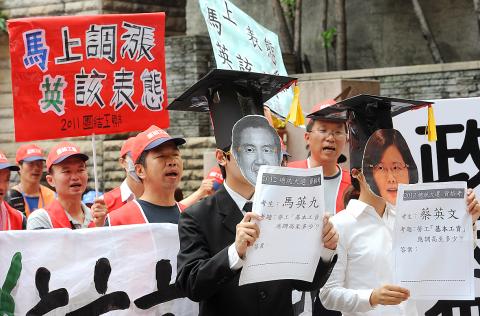Business and labor representatives are both unhappy with the new minimum wage announced by the Council of Labor Affairs (CLA) yesterday, with labor groups vowing to file a petition with the Control Yuan against the decision.
“We regret the decision, it is not acceptable,” said Lin Chin-yung (林進勇), a board member of the Taiwan Confederation of Trade Unions and the chairman of the Tatung Union.
“The minimum wage should be at a level that would allow laborers to feed their families, but the new minimum wage is apparently not sufficient for them to do so,” Lin said after walking out of the council’s meeting on the minimum wage, where he had been one of the labor representatives.

Photo: Liu Hsin-de, Taipei Times
After the meeting — which lasted about five hours — Council of Labor Affairs Minister Jennifer Wang (王如玄) announced the minimum wage would be raised by 5.03 percent, from NT$17,880 per month to NT$18,780, or from NT$98 per hour to NT$103 per hour.
Labor groups wanted a NT$23,459 monthly minimum.
Lin said labor groups would ask the Control Yuan to investigate whether the council’s decision was appropriate.
Business leaders said the decision would hurt them.
Chinese National Federation of Industries board member Tsai Sui (蔡穗), who represented businesses in the meeting, said the increase in the minimum wage would be too much of a burden for businesses.
“The 5.03 percent raise is just too much,” he told reporters. “The raise means businesses will have to spend NT$34.8 billion extra a year in salaries. This will hurt the competitiveness of Taiwanese businesses.”
Tsai said he would meet with President Ma Ying-jeou (馬英九) today to discuss the issue.
During the meeting, business representatives said they hoped to keep any increase to just 3.47 percent, the same as last year’s increase.
Businesses and labor groups have had a tense relationship ahead of the council meeting.
As the meeting started yesterday morning, hundreds of Taiwanese and foreign workers staged a demonstration outside the council’s headquarters in Taipei.
“We are here to support the demands of fellow Taiwanese workers,” a Filipino migrant worker said. “The minimum wage rule should apply to both domestic and foreign workers.”
When some of the labor group members tried to enter the building, there were clashes with police, but the conflict did not last long and no one was injured.

CHAOS: Iranians took to the streets playing celebratory music after reports of Khamenei’s death on Saturday, while mourners also gathered in Tehran yesterday Iranian Supreme Leader Ayatollah Ali Khamenei was killed in a major attack on Iran launched by Israel and the US, throwing the future of the Islamic republic into doubt and raising the risk of regional instability. Iranian state television and the state-run IRNA news agency announced the 86-year-old’s death early yesterday. US President Donald Trump said it gave Iranians their “greatest chance” to “take back” their country. The announcements came after a joint US and Israeli aerial bombardment that targeted Iranian military and governmental sites. Trump said the “heavy and pinpoint bombing” would continue through the week or as long

TRUST: The KMT said it respected the US’ timing and considerations, and hoped it would continue to honor its commitments to helping Taiwan bolster its defenses and deterrence US President Donald Trump is delaying a multibillion-dollar arms sale to Taiwan to ensure his visit to Beijing is successful, a New York Times report said. The weapons sales package has stalled in the US Department of State, the report said, citing US officials it did not identify. The White House has told agencies not to push forward ahead of Trump’s meeting with Chinese President Xi Jinping (習近平), it said. The two last month held a phone call to discuss trade and geopolitical flashpoints ahead of the summit. Xi raised the Taiwan issue and urged the US to handle arms sales to

State-run CPC Corp, Taiwan (CPC, 台灣中油) yesterday said that it had confirmed on Saturday night with its liquefied natural gas (LNG) and crude oil suppliers that shipments are proceeding as scheduled and that domestic supplies remain unaffected. The CPC yesterday announced the gasoline and diesel prices will rise by NT$0.2 and NT$0.4 per liter, respectively, starting Monday, citing Middle East tensions and blizzards in the eastern United States. CPC also iterated it has been reducing the proportion of crude oil imports from the Middle East and diversifying its supply sources in the past few years in response to geopolitical risks, expanding

Pro-democracy media tycoon Jimmy Lai’s (黎智英) fraud conviction and prison sentence were yesterday overturned by a Hong Kong court, in a surprise legal decision that comes soon after Lai was jailed for 20 years on a separate national security charge. Judges Jeremy Poon (潘兆初), Anthea Pang (彭寶琴) and Derek Pang (彭偉昌) said in the judgement that they allowed the appeal from Lai, and another defendant in the case, to proceed, as a lower court judge had “erred.” “The Court of Appeal gave them leave to appeal against their conviction, allowed their appeals, quashed the convictions and set aside the sentences,” the judges